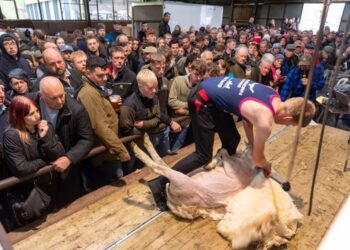
A major programme of peatland restoration has been completed on the Ministry of Defence training estate at Warcop, near Appleby, helping to deliver multiple environmental benefits.
The North Pennines AONB Partnership and the MoD have been restoring bare peat on the Warcop range since 2013 and, through the Pennine PeatLIFE programme — a major project to restore peatlands along the length of the Pennine chain — the rate of restoration has been increased over the past three years.
The work is said to be delivering many benefits to the local environment and wider society, with the healthy peat acting to capture carbon, helping to mitigate climate change.
It also helps to provide clean drinking water and slows the flow of water coming off the hill, reducing the impact of flooding downstream.
Over the seven years of restoration work, the AONB Partnership has installed coir rolls and wooden dams, and planted cottongrass plug plants.
The additional funding through the Pennine PeatLIFE programme meant that a further 140 coir rolls were installed.
It was also possible to spread heather brash, an important technique in peatland restoration which acts as a mulch, insulating the bare peat from frost heave, protecting it from erosion through wind and weathering and providing a seed source and growing medium for new plants.
Some 2,500 bags of heather brash have been cut, collected, transported and spread across five bare peat areas totalling 21 hectares.
All the bare peat was treated in July with lime, seed and fertiliser to kick-start revegetation.
It is calculated that by raising the hydrology of the blanket bog and revegetating the bare peat, the loss of 3,221 tonnes of carbon will be avoided over the next 30 years.
This is equivalent to nearly eight million miles driven by an average passenger vehicle or 372 average homes’ energy use for one year.
Paul Leadbitter, peatland programme manager for the North Pennines AONB Partnership, said: “This has been a multi-year project which, because of the nature of the site, has had its own unique constraints.
“We’re grateful for the support from the MoD in getting this major piece of conservation work completed, and we’d also like to thank our contractors, Dinsdale Moorland Specialists, for their efficient delivery of the work.”
Major Mick Lynch, from the MoD, said: “It was a challenge to make sure the site, which is actively used for training, was safe for the AONB Partnership to come in and carry out the work each year.
“However, the huge benefits of this restoration work in helping to tackle climate change and reducing the flow of water in flooding events meant that it was worth putting the work in.
“We’re pleased to have been able to restore the valuable peatland on Warcop Fell, and it is good to know that it will continue to have a positive impact in future.”
The AONB Partnership will monitor the site for a minimum of two years, including vegetation surveys across the five sites, fixed point photography, and measuring the progress of the restoration using drones.
Pennine PeatLIFE is being led by the North Pennines AONB Partnership in collaboration with Yorkshire Wildlife Trust and Forest of Bowland AONB Partnership.
The project is delivering 1,300 hectares of peatland restoration in the North Pennines, Yorkshire Dales and Forest of Bowland, establishing new restoration techniques to suit the unique climatic conditions and trialling innovative payment for ecosystem services methods to inform future peatland restoration funding streams.
The project is funded by the EU LIFE Programme and co-financed by the Environment Agency, Northumbrian Water, United Utilities and Yorkshire Water.































